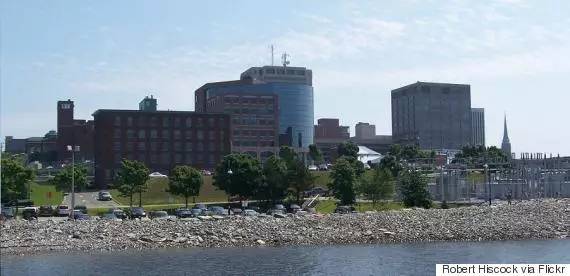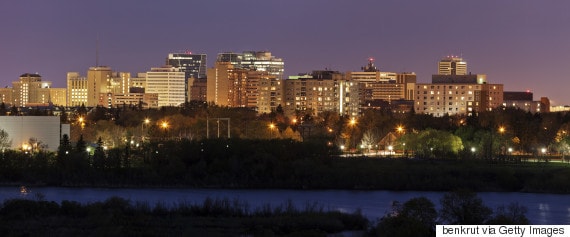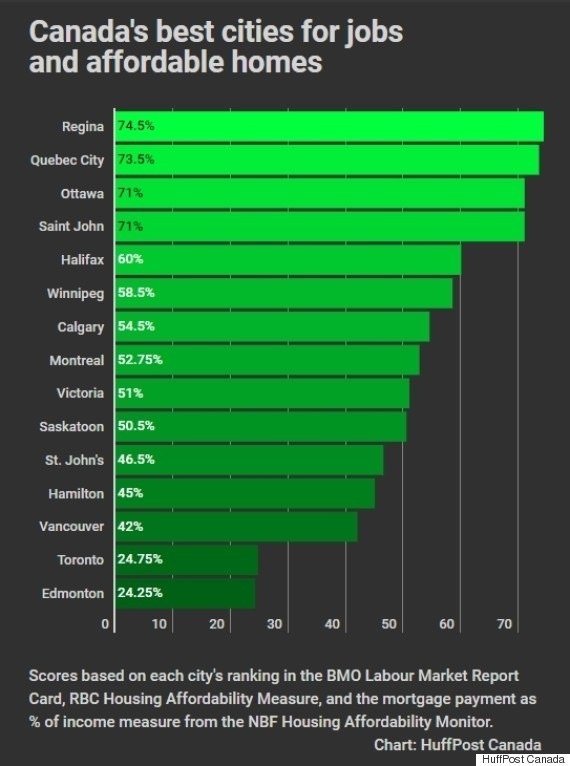Canada's Best Cities For Jobs And Affordable Homes
It’s one of the conundrums of life in Canada today: There are plenty of places where you can buy an affordable home, just not ones with many jobs. And in the big cities where the jobs are, housing just keeps getting more expensive.
But there is a middle-ground, at least for now — places that offer both decent job opportunities and reasonable house prices.
Using labour market data from Bank of Montreal, and housing affordability data from Royal Bank of Canada and National Bank, we scored 15 of Canada’s major cities on their ability to provide jobs as well as affordable homes.
It turns out government towns are a good place to find that balance. Four of the five best cities for jobs and affordable homes are provincial capitals:
5: Halifax

Jobless rate: 6.1% (Year ago: 6.6%)
Average house price: $306,240
BMO labour market ranking: 14 out of 33
RBC affordability ranking: 3 out of 14
Few people consider the Maritimes these days when thinking of relocating, but Nova Scotia’s capital city has been adding jobs at a steady clip and Halifax has the third-most affordable housing market in the country.
3 (tie): Ottawa

obless rate: 5.1% (Year ago: 6.6%)
BMO labour market ranking: 2 out of 33
Average house price: $435,883
RBC affordability ranking: 10 out of 14
Government and tech jobs drive Ottawa’s labour market, and both have been doing well recently. Ottawa grew its number of jobs by an impressive 2.9 per cent in the past year. Its homes are the least affordable on this list, but the city has the country’s highest average income, so the locals can afford it.
3 (tie): Saint John, N.B.

Jobless rate: 7.9% (Year ago: 8.3%)
BMO labour market ranking: 16 out of 33
Average house price: $172,547
RBC affordability ranking: 1 out of 14
The oldest incorporated city in Canada is middle of the pack when it comes to the job market, but it’s the most affordable city in Canada in which to buy a home. Its small labour market (it has a total of 67,000 jobs) makes it less likely you’ll find work there, but if you do, you’ll be able to afford a lot of house.
2: Quebec City

Jobless rate: 4.3% (Year ago: 5%)
BMO labour market ranking: 6 out of 33
Median single-family house price: $245,000
RBC affordability ranking: 8 out of 14
Better brush up on your French skills if you want to join the party in Quebec’s capital city. And what a party it is: The city is growing jobs three times as quickly as it’s growing its population, and the unemployment rate is a very low 4.3 per cent. Despite this, house prices aren’t rising.
1: Regina

obless rate: 5.2% (Year ago: 4.8%)
BMO labour market ranking: 9 out 33
Average house price: $316,990
RBC affordability ranking: 3 out of 14
Like Ottawa and Quebec City, Regina is yet another government town to make this list. The city is recovering fairly well from the oil price decline, and added 1.8 per cent new jobs last year, faster than population growth. Compared to incomes, it’s the third most affordable city in Canada.

But what about the worst cities in Canada for jobs and affordable homes?
The lowest scores in this ranking belong to Edmonton (24.25 per cent) and Toronto (24.75 per cent ), and both for different reasons.
Toronto has seen house prices soar in the past year (as much as 33 per cent, year on year, in March), while job growth has stagnated. It added 0.3 per cent new jobs over the past year, a period when its population grew six times as quickly.
Edmonton has much more affordable housing than Toronto ($439,438 for an average single-family home, versus $1.57 million in Toronto) but its job situation is brutal. It lost 3.5 per cent of all its jobs in the past year, and its unemployment rate rose 1.8 percentage points in a year, to 8.3 per cent.
Until things improve in the oil patch, this city likely won’t be topping any “best cities” rankings.
Thanks for Visiting the Post